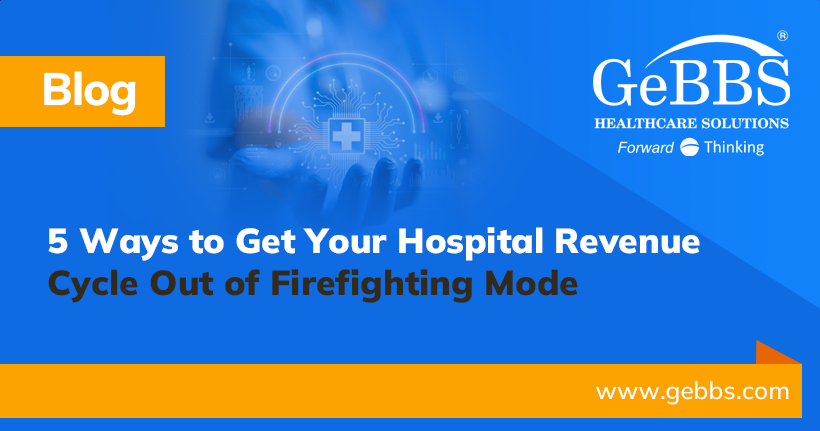The healthcare labor shortage has reached a crisis level. If the current healthcare workforce were a patient, it would be in critical condition.
“Critical” is a word the American Hospital Association (AHA) repeatedly used to describe the worsening healthcare worker shortage in a recent statement to a U.S. Senate subcommittee. As the AHA notes, the situation is so dire for some providers that resources like the National Guard have been deployed to meet staffing challenges.
As remaining staff scrambles to focus on delivering patient care, the labor situation has disrupted day-to-day processes related to patient contact and claims management that are essential to a healthy revenue cycle. As we’ll explore below, one solution is to partner with a managed service provider specializing in healthcare-focused technology, human resources and business processes.
The Healthcare Staffing Shortage Impacts: By the Numbers
As the effects of the ongoing labor predicament demonstrate, having the right human resources in the healthcare workforce may be more important than ever to a provider’s survival. Many job categories in which staffing shortages are the most extreme are roles that are vital to a fluid revenue cycle.
Of the more than 1,100 hospitals that report staffing data to the federal government, nearly 30 percent indicated they faced an immediate and critical staffing shortage, according to the AHA statement. Furthermore, 15 states reported that more than 33 percent of their hospitals likewise confronted an acute human resources shortage.
The United States could face a deficit of more than 200,000 registered nurses by 2025, according to a recent nursing workforce report by the consulting firm McKinsey & Company. Within many healthcare systems, nurses are involved in patient care and capturing information crucial to efficient claims management and resolution.
Likewise, the United States could experience a shortfall of more than 3 million lower-wage workers within the next five years, according to healthcare labor market research by the asset-management firm Mercer. These positions include medical assistants, home health aides and other roles that, like nurses, have become increasingly integral to revenue cycle operations.
Unless the labor shortage is addressed with qualified human resources, it — in conjunction with rising labor costs and recurring supply chain problems — will drive higher expenses and a subsequent revenue decline, particularly for nonprofit and public healthcare providers.
Managing Healthcare Human Resources Challenges
Different states and health systems are attempting to solve the labor shortage and mitigate its effects on the revenue cycle and patient care.
For example, several state governors have asked for higher compensation for healthcare workers. Other governors have proposed broadening healthcare education programs to train more nurses and other medical staff.
But as healthcare leaders know, the need for human resources is immediate. Many providers can’t wait for higher salaries to draw more workers or for outreach programs to funnel new staff into the workforce.
Some healthcare providers have turned to reskilling or upskilling remaining staff to bridge process gaps, but those employees are often already stretched thin. Worker burnout has emerged as the leading cause of healthcare staffing resignations in the wake of the COVID-19 pandemic.
According to a recent Healthcare Financial Management Association (HFMA) commentary, one method for tackling the healthcare employment crisis is a holistic approach to human capital management. This includes a mix of qualified human resources whose roles and productivity goals are clearly defined and technology capable of automating certain tasks and providing actionable metrics.
A business process outsourcing (BPO) partner can help fulfill urgent human resources needs and revenue-cycle management (RCM) functions. But it’s important to work with a forward-reaching provider who is dedicated to and understands the nuances of healthcare.
The Benefits of a Healthcare BPO and RCM Partner
A healthcare solutions provider might not be able to fill the expanding void of physicians and nurses. Still, it can offer a scalable blend of technology and human resources designed to optimize workflow, improve financial performance and enhance the patient experience.
Consider the escalating number of medical coding and billing errors in recent years and their financial impacts. A healthcare BPO and RCM partner should have a coding team certified by the American Health Information Management Association (AHIMA) and the American Academy of Professional Coders (AAPC).
The coding and billing team should further be well-versed in commercial and public health plans and understand federal and state regulations regarding healthcare services. This team should be able to improve productivity and accuracy, leading to accelerated claims processing and higher reimbursement rates.
Patient contact has also suffered from the strain of the pandemic and labor shortage. A BPO and RCM partner should offer patient contact solutions that utilize skilled customer-service professionals who specialize in healthcare and can guide patients through every step of their journeys, from scheduling to collections.
These human resources should be augmented with AI-enabled technology capable of automating diverse tasks otherwise performed by overburdened staff. This technology, in turn, should offer secure and targeted data sharing, support interoperability, maintain compliance with new and emerging standards regarding medical coding and electronic medical records, and generate real-time insights that leaders can use to make knowledge-based revenue-cycle decisions.
No, the healthcare labor dilemma is not going away anytime soon. But there are resolutions for many of the problems it presents as health systems try to rebuild a devastated workforce.
GeBBS Healthcare Solutions: Forward Thinking
GeBBS Healthcare Solutions is an acclaimed and innovative leader in healthcare RCM solutions. We’re committed to helping our clients amplify their revenue cycles and achieve measurable productivity improvement through comprehensive services that include a mix of highly skilled human resources and state-of-the-art technology.
GeBBS has earned widespread accolades for its AI-enhanced technology and qualified personnel, which can be promptly deployed to meet a healthcare provider’s individual billing, call center and medical coding needs. We’re proud to be recognized as one of Black Book Market Research’s Top 20 RCM Outstanding Services, Modern Healthcare’s Top 10 Largest RCM Firms and Inc. 5000’s Fastest-Growing Private Companies in the United States.
Request a consultation today at gebbs.com to learn how GeBBS Healthcare Solutions can help you address your current needs and grow into the future.






